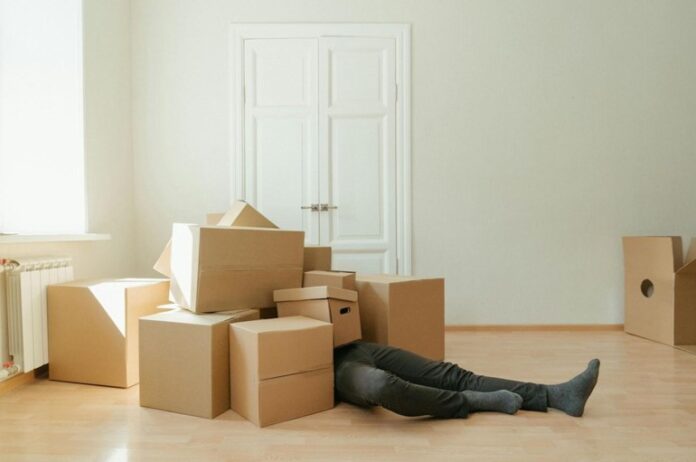Moving house might not seem like a physically demanding job—until you’re halfway through lifting a couch down a narrow hallway or hauling boxes up and down stairs. The truth is, even a short-distance move can take a serious toll on your body if you’re not careful. Strains, sprains, and back injuries are surprisingly common on moving day—but they don’t have to be.
A few smart habits can help you avoid hurting yourself while moving home. Whether you’re doing it solo, getting help from mates, or hiring the pros, here’s how to stay injury-free from start to finish.
1. Wear the Right Clothes
Moving day isn’t the time for fashion. You’ll want clothes that let you move freely but aren’t too baggy. Baggy clothes can get caught on door handles or corners, which can throw off your balance. Closed-in shoes with a solid grip (like work boots or trainers) are essential—no sandals or thongs.
2. Lift With Your Legs
It’s a classic for a reason. Bending at the waist while lifting is one of the fastest ways to pull a muscle or strain your back. Instead, squat with your knees, keep the box close to your chest, and straighten your legs to lift. Don’t twist your upper body while carrying—pivot with your feet to turn.
3. Clear the Path First
Before you start moving anything, do a quick walk-through of your home. Make sure all hallways, doorways, and staircases are free of clutter. Remove loose rugs, shoes, toys, or anything else that could cause a trip. If you’re working in the rain, lay down old towels to prevent slipping indoors.
4. Don’t Try to Do Too Much at Once
You don’t win a medal for carrying the biggest box. Injuries often happen when people try to lift more than they should. If something feels too heavy, ask for help or split the load. There’s no shame in taking two trips—it beats taking a week off to recover from a pulled back.
If you’re moving big appliances or heavy furniture, using a dolly or trolley is a smart call. They’re affordable to rent and can save you a lot of pain later.
5. Hydrate, Fuel Up, and Take Breaks
Moving is hard work. You’re on your feet all day, lifting, walking, and sweating—especially in summer. That’s why it’s crucial to drink water regularly and eat something nourishing. Keep fruit, muesli bars, and sandwiches on hand for easy snack breaks. And take a moment to rest every hour or so.
Fatigue increases your chances of making a mistake or misjudging a lift. Pausing for 10 minutes here and there might feel like slowing down, but it’ll keep your body in better shape for the full day. These are the kinds of tips for moving home that most people overlook—but they make a real difference.
6. Use the Right Tools
There’s no need to brute-force everything. Use gloves for better grip, moving straps for big pieces, and furniture sliders to shift bulky items without lifting. These tools are designed to take the load off your body and protect your floors and walls, too. Most are cheap to hire or buy at your local hardware store.
7. Don’t Forget About the Weather
Rain, heat, and even wind can all make moving riskier. Wet walkways can cause slips, while extreme heat can lead to dizziness or dehydration. If you’re expecting rough weather, plan ahead. Start earlier in the day, have towels or tarps on standby, and stay cool. Sunscreen and hats are a must in the Aussie summer.
8. Get Kids and Pets Out of the Way
This one’s often forgotten. Moving day can be chaotic, and having little feet or paws running around only adds to the risk. If you can, arrange for someone to watch your kids or pets for the day. If that’s not an option, set them up in a quiet, closed room with food, water, and entertainment to keep them safe and out of harm’s way.
9. Know When to Get Help
At some point, it’s smarter to call in the professionals. If you’ve got large furniture, tight hallways, or just too much to handle on your own, a removalist crew can save you hours of work—and possibly save your back too. A company like Butler’s Removals & Storage has the tools, training, and experience to move your belongings quickly and safely, no guesswork required.
10. Listen to Your Body
This might seem like common sense, but it’s one of the first things people ignore on moving day. If you start feeling sore or notice a tweak in your back or knees, stop. Take a break. Apply ice if needed, and don’t push through the pain. It’s better to pause now than deal with a full-blown injury later.
Final Thoughts
The key to a safe move is preparation. From how you lift to how you dress; every choice can either protect you or put you at risk. Injuries might not be the first thing you think about when planning a move—but a few simple precautions can save you from weeks of discomfort.
And if you’d rather avoid the strain entirely, let the experts handle it. The team at Butler’s Removals & Storage offers reliable packing and unpacking solutions that make moving day smoother, safer, and a whole lot less stressful.

